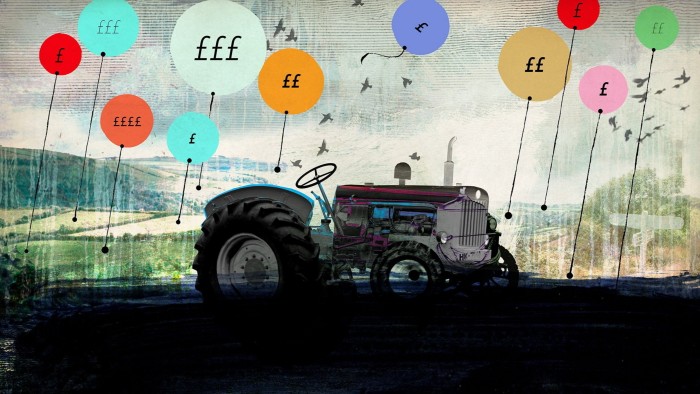Unlock the Editor’s Digest for free
Roula Khalaf, Editor of the FT, selects her favourite stories in this weekly newsletter.
Britons rarely think about the large swaths of land which form the backdrop to our nation’s soul. We urban types who occasionally visit the countryside, to stare at fields of wheat, grazing sheep and hedgerows, assume these will always be there. But the current row within government, over how many family farms may be hit by measures in the recent Budget, exposes a vital question. In a small, increasingly crowded country, we need to be clearer about what land is for.
As desperate farmers debate whether to go on strike, their case is not helped by having multi-millionaire spokesmen. Sir James Dyson and Jeremy Clarkson are shrewd entrepreneurs but not born farmers (as brilliantly chronicled by Clarkson in his hit TV show). It’s not impossible to imagine that Dyson’s decision to amass 35,000 acres of farmland might have had less to do with a passion for soil, than for the tax loopholes the chancellor has just tried to close.
But in trying to hit what it thinks of as the “rich”, the Treasury has failed to distinguish between working people who steward the land for generation after generation, with no desire to sell, and others whose interests are more cynical. Agricultural land is increasingly being bought by hobby farmers and second-home buyers seeking a protected view, for whom the new 20 per cent rate of inheritance tax still beats 40 per cent; and by corporate interests seeking to diversify their risk profile, “offset” carbon, or fulfil the “biodiversity net gain” required for property development. In May, Royal London Asset Management Property bought one of the largest UK collections of prime farmland, through an English limited partnership as a wrapper for a Jersey property unit trust.
The race for carbon credits has helped farmland prices reach record levels as domestic and foreign investors pile in. By pushing up prices, such moves also drag asset-rich, cash-poor family farms into new tax brackets. Last year, half of farms made either a loss or less than £25,000 profit, according to Defra. The land which will be sold off to pay the potential inheritance tax bills could go to companies that don’t pay inheritance tax at all.
The Brexiters are partly to blame for farmers’ growing despair. Just as they had no plan for the economy once we’d left the EU, they had no idea what to do once they’d cut their hated Common Agricultural Policy subsidies. The Johnson government dithered and blathered, offering small, fiddly grants. It extolled British animal welfare and food quality, but waved in imports full of chemicals and signed a trade deal with Australia which was a triumph of doublespeak. It eventually settled on paying farmers to improve soil and biodiversity. Now, the new government has frozen those grants, throwing the sector into yet more turmoil.
What is missing is any strategic thinking about how we use land to meet competing objectives. How do we trade off food security against energy security? Ministers have approved a four-mile end-to-end solar farm on prime agricultural land in Lincolnshire. At what rate does government think it’s safe to displace food production, with changing weather making harvests increasingly unreliable everywhere? Where should we build the new homes needed to house a burgeoning population? Almost 300,000 homes were built on prime farmland between 2010 and 2022, according to the CPRE, the countryside charity. The Environment Agency says that 5.2mn homes and businesses in England are currently at risk of flooding.
Add up all the current government commitments, and you begin to see how badly we need to bridge the silos. The UK government is committed to increasing English woodland by a million acres — a larger area than Kent — and to creating new habitats for biodiversity by another million. It aims to enlarge the protected areas of England (National Parks and Areas of Outstanding Natural Beauty) by around 1.8mn acres, to build more houses and to increase renewable energy — all while maintaining self-sufficiency in food at 60 per cent. At the same time, floods and drought are threatening harvests, which climate change will make worse. Some kind of land use framework is urgently needed to ensure, in the words of the parliamentary land use in England committee, that “we are doing the right thing, in the right place and at the appropriate scale”.
I am all in favour of net zero. But I’m not sure I want my taxes spent on the Forestry Commission’s impenetrable forests of spruce and corporate greenwashing. I’d rather subsidise farmers who reduce our reliance on food imports, who can steward the land to limit flooding, and who’ve spent the long years since Brexit learning how to farm with nature rather than against it. People like James Rebanks, whose book The Shepherd’s Life chronicled the struggles of three generations of Cumbrian sheep farmers. The fact that it became a hit internationally is a reminder that landscape has deep meaning to humans; it is so much more than a commodity.
At the very least, we need a level playing field. If we want British farmers to set aside land for biodiversity and phase out chemicals, we should tax food imports according to their carbon footprint. If we want them to steward the land and maintain food production, we should not give unfair advantages to corporations. We need to end the naivety around agriculture which has characterised every government since 2016. It’s dangerous to simply assume that people will continue to farm the land for the love of it.
Read the full article here

